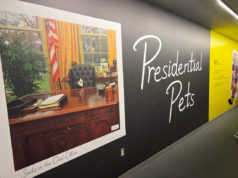Fort Worth is pretty lucky. We don’t have to deal with all of that art-world drama and hand-wringing over “good” versus “bad” art or, more specifically, “genuine” versus “commercial” art.” We’re not saying that reading the international critics isn’t a blast. It’s awesome. Every other day in London Jonathan Jones is flipping out over the enormous sums paid at auction for “crumminess,” and in the de facto capital of the art world, New York City, Jerry Saltz continues lamenting the “new orthodoxy, one supported by institutions and loved by curators who can’t let go of the … glory days.”
In some ways, Fort Worth could use a little more international flair. Though Brand 10 Art Space and Fort Worth Contemporary Arts might exhibit work that manifests Saltz’ “new orthodoxy” and Jones’ “crumminess,” the galleries remain vital, challenging otherwise staid Fort Worth’s preconceptions (and misconceptions) about art to expand the collective intelligence. Do Fort Worthians care about art? Based on the swarms of people who turn out on spring and fall Gallery Nights and the Arts Goggles, yes, but there’s no real critical dialogue here. The daily paper rarely covers gallery shows, and when it does it’s not to be critical but instructional, and your trusty alt-weekly’s coverage is spotty at best. (Too many hats, too little head.)
But maybe the lack of drama is a good thing. No one cares what critics think, anyway, right? Too bad, because Fort Worthians would probably like to know that their city is kicking ass. Forget about the museums for a moment –– we all know they’re doing great work. The galleries are really thriving. The past couple of months alone have seen some tremendous exhibits, and at the top of the list has to be Go Figure, a group show at Artspace 111 by four of the best visual artists in North Texas, who all happen to be women, all from Fort Worth and each with a different approach to figurative painting.
Two recent MFAers from TCU, Michelle Brandley and Devon Nowlin share a subdued palette, which complements their often moody subject matter. Brandley conjures up a sort of edgy classicism. Influenced by early Hollywood and vintage graphic design, she often juxtaposes geometric forms with women’s fleshy parts (lips, legs, breasts), creating unpredictable, chameleonic tableaux, almost like halls of mirrors, that somehow manage to confront the male gaze directly.
Nowlin, who also explores geometry in photorealist settings, tends to train her focus on fleeting moments, which could be seen as a form of aesthetic allegory –– what’s really going on in the peripheries of life? A couple sleeping, a woman pushing a gorilla sculpture wrapped in a translucent plastic tarp across a gallery floor, a frat bro Tebowing –– by honing in on the humdrum, Nowlin, who has the eye and dexterity to recreate any image she pleases, transcends art to achieve something resembling philosophy.
In her tack, she resembles elder stateswoman Nancy Lamb, whose painterly reproductions of snapshots of social situations are cheeky and brilliantly colored, and they command thousands of dollars. Hands, mouths, hair, jewelry, handbags, cocktails, bevnaps, you name it –– every peripheral accoutrement of the gilded class at play –– get jumbled into sometimes awkward, sometimes tense moments on her canvases. One of Lamb’s loudest pieces, “Royal Crown Neat,” in which Queen Elizabeth looks lost beneath her prismatically hued crown (worn askance), goes for a cool 10-large.
Celebritydom, as a subject, often works both ways, appealing to the populace (and buyers) while pissing off critics, who hate seeing Art-with-a-capital-A tainted by middlebrow nonsense. Not that Sarah Green cares. By their nature as digital paintings, her luminous portraits of celebrities call into question their origin. Like how Hollywood tricks us into believing those ravenous dinosaurs and zooming starships are real, Green may have you guessing: Did she paint that by hand, or did a computer do it?
Go Figure is down now, but there’s still much more to see in town, proof that the art world isn’t ending. In a recent discussion at the Institute of Contemporary Art, four art-world insiders discussed “the perceived backlash against contemporary art,” writes moderator and ICA executive director Gregory Muir, “with headlines of record-breaking auction prices contradicting news of artist defections, disillusioned critics, over-production, the collapse of the middle market, and the growing difficulties faced by younger artists and their galleries.”
Buying “crumminess” isn’t new and will never go away. And the more crap that’s purchased, the more crap that’s going to be produced, because all artists, whether they admit it or not, are influenced by the market, which is influenced by the zeitgeist, which is influenced by the market. It’s all a detestable cycle. The best ways to avoid it are to flip the script (e.g., have a buddy film you standing in front of bad contemporary art and puking) or, apparently, to stay put in quiet ol’ Fort Worth.












